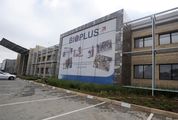TEL AVIV — The United States should be allowed to co-produce Israel’s Iron Dome rocket interceptor so it can benefit from the money it has poured into the Jewish state’s defence programmes, a senior Israeli military officer said on Wednesday.
Israel developed Iron Dome — the only system in the world to use radar-guided missiles for short-range interceptions — to shoot down rockets launched from the Gaza Strip.
US President Barack Obama, who arrived in Israel on Wednesday to underscore his backing for the country’s security, has earmarked hundreds of millions of dollars for Israeli defence programmes, including Iron Dome.
Brigadier-general Shachar Shohat, the commander of the Israeli defence force, said it was important for Israel to show its appreciation to Mr Obama as the administration decides where to make spending cuts to reduce the budget deficit.
Israel opposed a joint production of the system when it was proposed in Washington last year but Mr Shohat said such a venture would allow the US to gain from their financial largesse.
Mr Obama will visit an Iron Dome battery near Tel Aviv’s airport, where he will be briefed by Mr Shohat, who said he would thank the president for his administration’s military backing.
"I understand the need of the other side to encourage investment in its side ... certainly given US policy of trying to create jobs during a troubled economic situation," he said in an interview. "To me, it is clear that the American partner also has to look out for the American economy."
Some experts have suggested the United States might eventually want to use systems such as Iron Dome to protect zones in combat situations such as Afghanistant.
The Israelis say it has a more than 80% shoot-down rate of the short-range rockets favoured by Gaza guerrillas.
The US House of Representatives’ Armed Services Committee last year called on the Pentagon’s Missile Defence Agency to "explore any opportunity to enter into co-production" of Iron Dome, given American funding of the system, even though Washington has no rights to the Israeli technology involved.
The United States is already working with Israel to co-produce the ballistic missile interceptor Arrow and a mid-range counterpart, David’s Sling, which is due out this year.
Mr Shohat supported the idea of setting up a parallel US factory to make Iron Dome’s Tamir interceptor missiles, saying this could be a "win-win situation" for both countries.
"Opening joint manufacturing lines would increase production rates, which is of course is in my interest as the professional user," he said.
Dollars and sense
Last year, Israel offered its US ally Iron Dome know-how on the kind of technologies used in Tamir, as long as intellectual property rights were protected.
The Israelis said at the time, however, that co-production was not an option as it could hamper output by state-owned manufacturer Rafael Advanced Defense Systems Ltd.
Israel is also upgrading Arrow for any conflict with Iran or Syria, and bills David’s Sling as a bulwark against the powerful rockets of Lebanon’s Hezbollah. Boeing Co and Raytheon Co are the respective US partners in those systems.
The Pentagon says Israel’s air defence will not be affected by across-the-board US spending cuts but some planners in Israel who want to increase Iron Dome deployment from five to 13 batteries fret about future shortfalls.
"What would be impacted, mainly, is the pace at which we equip ourselves," Mr Shohat said. "Bottom line, I need as many (air defence units) as possible, and as quickly as possible."
Investing in the systems has been part of the Obama administration’s strategy of reassuring the Israelis about world powers’ efforts to negotiate a curb on Iran’s nuclear programme.
Seeing the makings of a mortal threat, Israel, which is assumed to have the region’s sole atomic arsenal, has threatened to pre-emptively attack its arch-foe. Should that happen, Tehran, which denies seeking the bomb, promises wide-ranging reprisals.
Reuters




















Post a comment